Abstract
This paper it is focused on theoretical and innovative approaches that wants to identify the best strategies for reducing the children institutionalization coming from the family type protection system, mostly from the foster family. The theme proposed has a great importance in the current context in which, although foster care is a temporary measure of alternative protection to the institutionalization of children, these are often not found to be a definitive measure and they remain very long in the foster family. Because of this, many foster parents do not cope with the new behavioural changes of teenagers, they fail to have an effective management that reduces stress and because of this, many young children are abandoned again, foster caregivers give them back to the placement centres. The study will look at a theoretical foundation in our country and will make an important contribution to the theory and practice needed to educate and support professional foster care person for developing skills and optimal strategies for coping with difficulties in raising children in the foster home. The theoretical aspects are based on practical interventions based on the lack of capacity of foster parents to cope with the teenagers’ problems or for many of them with their special needs.
Keywords: Children in foster carecoping strategiesadolescenceadult educationpersonal development
Introduction
Family, environment of human personality’s plenary development
Every person, child or adult belongs to someone, belongs to a family, regardless of its structure, or how it is organized. It is important that every child to grow up in a safety environment, along with both parents offering unconditional love and acceptance. Because each person is unique, with its own scenario of life, we observe that in many families that unconditional love is not possible, that instead the role of the mother and father is taken by grandparents or other relatives, or even other individuals alien to the biological roots, adoptive parents or foster parents.
The family, his first living environment, exerts a considerable influence on its development throughout life. Families are different in social structure, socially, geographically and culturally, but we often met people who grew up without an optimal family environment, where children that lived in that bedroom with one or more beds or women who are changing daily, represented their family, we start wondering how traumatic is for that child the separation from his family for reasons independent of him and what resources he’ll find to succeed in becoming an autonomous adult and psycho-emotionally balanced.
Of course each family’s history, with its specific, offer uniqueness to each person and each family contributing to shaping a child's personality profile and future adult’s too.
Parenting, seen as a defining element of each adult to care, love and educate natural children, adopted or in foster care, is that capacity of the human being who is born and develops natural and normal, being inside of us, because, in our childhood, we got this blessing of love and protect those we call family members and that we give to the next generation to whom we are responsible for.
In order to fully exercise the parental role, I believe that it is necessary, in addition to the innate abilities, to constantly learn in order to accompany the child on the road of its development. Parenting as an essential component of family life has two forms, acquired and learned, that only together, working together, can contribute to creating an optimal environment of the child and future adult, psycho-emotional and behavioral stable. Child development depends on the quality of the relationship between parent and child and affectionate relations, assessment and valorization lead to increased self-esteem and optimal development of the child.
On the other hand, the parental role occurs in complementing the conjugal role. We can talk about exercise the parental role in the absence of marriage, when referring to single-parent families, but essential for a child is a family environment that could provide both sex-role models.
"Adoption, assuming and exercise by both partners of conjugal and parental roles compatible symmetrical is decisive for the family balance , and for entering and maintaining healthy relationships in a family" (Enache, 2010, p. 29,30).A child in any family environment would increase, either naturally or by substitution, needs to be provided with all conditions for optimal growth and development.
Specialized legislation provides that, "The child is entitled to be respected of his personality and individuality and may not be subjected to corporal punishment or other humiliating or degrading treatment. Disciplinary measures of the child cannot be established only upon the dignity of the child, physical punishment is not allowed under any circumstances. "(Law no. 272/2004, para.33.1,)
Thus, the contemporary parents are moving from the authoritarian model, when raising a child relies more on power and control, towards a model characterized by openness, trust and consistency in setting and enforcing rules, boundaries and appropriate expectations.
Parenthood with positive attitude promotes growth without violence. Developments in recent decades have brought significant changes in attitudes and behaviors related to child punishment. Even if, in the short term appears to be effective by inducing obedience, long-term physical punishment instead of child’s discipline can lead to the development of opposite behaviors, such as aggression, delinquency and antisocial manifestations. Children also develop feelings of fear, anger and anxiety and learn wrongly that force and not logical arguments, prevail in conflict resolution.
However, often, parents fail to be in a psycho-emotional balance which gives children security, trust and joy. Although they love their children and make efforts to provide optimal material conditions it happens that their behavioral patterns learned through authoritative education received from their parents, to be now guides of the education of their own children, especially in times of stress, which fail to manage in a nonaggressive way.
When parents explain, negotiate and argue, both sides learn. The child grows up learning about responsibility, self-control, equality. The child is seen as active and competent person; and child autonomy increases. (National Authority for Child Protection, 2006). In many cases it happens that parents should not find suitable methods of education because of its psycho-emotional conflict together with professional and family stress which leads to undesirable behavior in later parenthood. In those conditions the parents need support to be able to manage such situations.
In conclusion and bringing to the fore the role of the family in child's personality development, we define family as the environment that ensures the complex needs of children: love and emotional security, new experiences, encouragement and appreciation etc.
There are also situations where the biological parents are unable or unwilling to take responsibility for their children's care. Consequently, children from these families are at risk of abandonment and separation trauma has profound repercussions on the child's personality, the more so if it remains institutionalized. Separation from parents and the lack of a secure family environment, be it a long-term separation, or short-lived, is experienced as a trauma and emotional imbalance that leads to a major child in this situation.
An alternative to institutionalization of children is the placement. Placement of children is a measure of special protection, an alternative of their institutionalization, being temporary, and the child without parents (even temporary) will be placed on a person or family who may or may not be a relative up to the fourth degree. Therefore, it specifically aims to place the child in an extended family or foster family. If child cannot be placed through up to fourth degree relatives as caregivers, they are assigned to a professional foster parent.
While placing the child in a foster family is a beneficial alternative to institutionalized care of children, the abandonment constitutes an extreme form of separation of children from its parents, and the entire traumatic experience lead to multiple repercussions on the personality of these children.
Attachment and separation in substitutive parenting context
We cannot talk about the child's placement in professional foster care (foster parents), without taking into discussion two terms defining both for the child and the parent of substitution in whose care they are: attachment and separation. From attachment to maternal figure, the separation from it, following attachment to the foster parent and then separation when a child goes into an adoptive family, and will attach to other parental figures, which fortunately can be bonding, without experiencing another separation. Between attachment and separation occurs abandonment known as having a negative impact at a profound psycho-emotional level, so a child as small as he can be, will personally experience a trauma of abandonment.
The existence of innate predisposition of individuals to form intimate connections with other individuals, defined by Bowlby (1969) as an attachment, is a basic component of human nature.
Furthermore, Ruppert (2012) agrees that attachment as a psychological process that develops before birth and then complements this attachment develops after birth, using all channels of sensory modes of verbal and nonverbal interaction.
The separation is the devising of people that the child was attached to, for a period of time or permanently. These separations of children do not go unnoticed, and after a shorter or longer time, small children may have different disorders, expressed through body language: brutal fever, vomiting, diarrhea, ear infections, food refusal, denial of sleep etc. Reactions of separation at small children can take the form of regression or depression when are separated from their parents or fosters, reactions that may persist for an extended period even after the child and carrier reunite, due to fear of the child that the foster parent can leave or could disappear again. (Mitrofan, & Buzducea, 2002).
How could we understand the situation of children who are placed in foster care over five, seven, ten, although it is intended to be a temporary measure of protection ... Time passes, and with him also the insecurity of these children, they know they are different because they have different name as the foster family, they know they do not belong to that family, although they are attached to it and love their "parents" and "siblings" because it considers their family. Despite they were told that they will have a mother and a father that they will to grow up in a family of their own, this does not happen. More painful for them it is when they see their "brother" or "sister", which came after him in the foster family, that he or she was elected or chosen by some parents and will have his/her own family. That’s when they start wondering, “Why was he/she elected and not me?” At the same time it maintains the separation anxiety, anxious behavior and the attachment wishing he could stay forever in the foster family to which they are already attached. They start to wonder how they could stay in the family, knowing the temporary nature of this child protection measure. Some children ask their foster parents to adopt them to bear the same name, to feel safe, or like those who grow up to feel that they belong, while others suffers again the trauma of abandonment, being moved in a placement centers.
Problem Statement
The family stability environment is essential in the optimal psycho-emotional development of a child. Therefore, it is avoided the repeated transfer of a child to several foster families, or to a foster family back the placement centre.
The statistics tell us about a decrease in the number of foster parents, not being adequately prepared and sustained psycho-emotionally to meet the challenges of children with disabilities coming to teens or those with a behavioural problem.
I had the opportunity to talk to young people in the residential protection system, which came here after spending many years in a foster family. All the youth in that discussion group wanted to return to the foster family, being aware of the benefits of being raised in a family environment compared to the residential one. They told their foster parents mather and father, still emotionally attached to them.
The reasons for which foster parents decide to give up the children they have grown since they were babies, are multiple. On the other hand, it may be related to changes in family structure such as death, separation, etc., may be related to the health of the foster parent, but in most cases they no longer face the difficulties encountered in dealing with adolescents and their behavioural problems. The foster parent is responsible for the education and safety of foster children and often the pressure of the group is so great that young people decide to drop out of school, leave home and even commit delinquency. In this context, foster parents give up the growth of these children. On the other hand, it is the category of foster parent who have in their care adolescents with neuro-psychiatric disabilities. Although raised in a family environment, they have made significant progress in adapting to social, educational, etc., hormonal changes specific to age leading to behavioural changes accompanied by acts of verbal and even physical violence are factors that lead to the decision to send these young people back in the residential protection system.
Effects of institutionalization of children, following leaving the family environment
The psycho-behavioral effects of institutionalizing children after leaving the foster care system in the placement center are described by both educators and foster parents. Following the interview, the specialists mentioned a series of emotional, behavioral and cognitive changes in children with disabilities left in the placement center such as: apathy, episodes of crying, psycho-motor agitation, negativity, rejection, aggression towards center staff , regression, etc.
Intervention strategies and support for the professional foster parent
Research Questions
The questions that we put in the study are:
Caring for a child by the long-term professional foster parent leading to separation and institutionalization has negative psycho-behavioural effects on children, including children with disabilities?
Can the phenomenon of abandonment of teenage children or those with disabilities be reduced by foster parents?
What needs foster parents have to be supported in order to be able to grow and educate their children in their own families, without having to leave them in the placement centre?
Purpose of the Study
The understanding foster parents needs in relation to adolescent growth and identifying optimal solutions to reduce abandonment of adolescents and those with disabilities, in the placement centres.
Research Methods
- In realizing the study, the methods used are the questionnaire and the interview, applied both to professional foster parents and educators in placement centres. They answer the above questions about the effects of institutionalizing a child who has been raised in the family substitute environment; identifying the needs of foster parents to find solutions to reduce their segregation to help them grow and educate their children in their families without having to leave them in the placement centre(Sîntion, & Călin, 2014).
Findings
The institutionalization effects on children from the perspective of foster parents and educators from placement centers.
On the question about the institutionalization effects on children raised by foster parent, both foster parents and placement center specialists considered placing the child with disabilities from the professional foster care at the placement center at risk of progressing initially in different areas of development. In the placement center due to the small number of employees who are not in agreement with the large number of children, they do not receive the necessary attention they need and obey; in the family they receive more love, affection, attention, care that helps in their recovery; the trauma of separation from the foster parent leads to emotional imbalance as a result of the loss of an attachment relationship; regression of adaptive skills; aggravation of behavioral disorders; borrowing
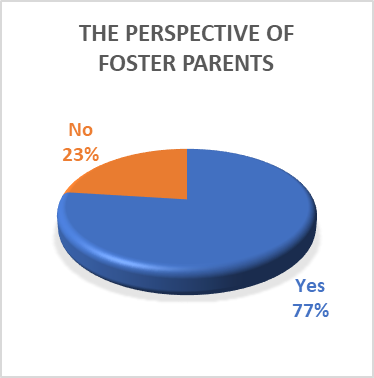
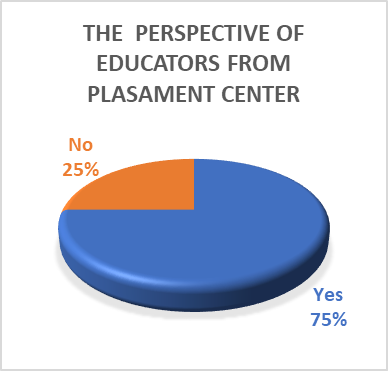
The figure
The need for continuing professional training for foster parents
Most foster parents are aware of the need for continuing professional training for optimal growth and care of children as well as for their own emotional support and personal development in different areas: childcare and education; communication with teenagers, caring for children with disabilities, preparing teenagers for independent life, etc.
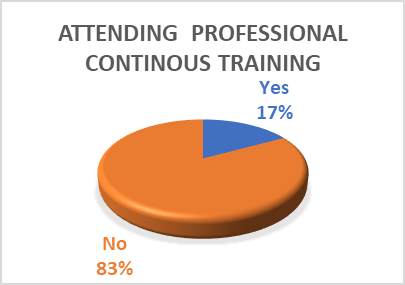
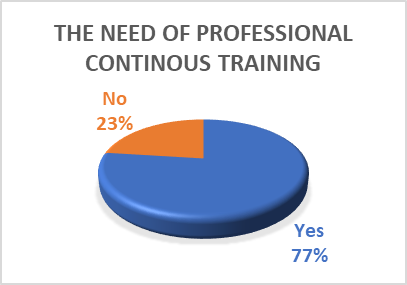
The figure
The necessary support expressed by the foster parents
Foster parents have identified as necessary to prevent and reduce the abandonment of children in placement centers the some types of activities they want to participate, presented in the figure
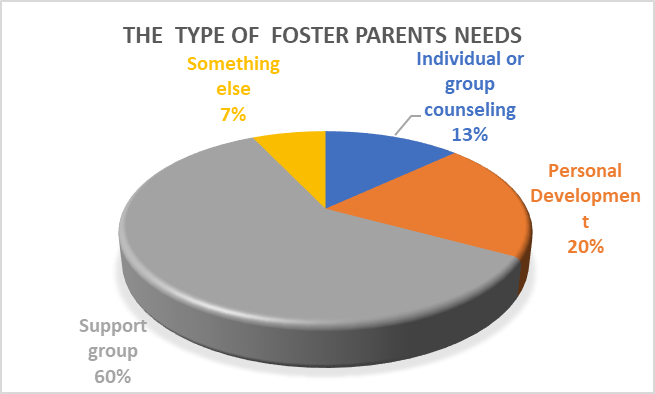
We can see that more then half ot the foster parents want to participare support groups - regular meetings with other professional foster parents, facilitated by specialists (60%), personal development it is wanted by 20% of them and individual or group counseling (13%). The 7% of them who responded with "Other" said they needed family support, considering it the most important to address the challenges of this maternity care profession.
Conclusion
In conclusion, we can say that continuing professional training, accompanied by constant psycho-emotional support, will give the foster parent the opportunity to find the optimal solutions to the problems identified in the relation with the adolescents in the placement, including those with special needs. Thus, there is a need for an integrated adult education strategy, care professionals for children without natural family protection, continuous training that includes emotional support through support groups and personal development.
References
- Bowlby, J. (1969). Attachment and Loss: Attachment, vol.1, Basic Books, New York.. In Wallin, D. J. (2010). The attachment in psychotherapy. Bucharest: Trei Publishing House.
- Enache, R. (2010). A Psychological Perspective on Maternity. Bucharest: Sper Publishing House.
- Law no. 272/2004 On the protection and promoting the rights of the child. Emitent The Parlament of Romania, Published in Official Monitoring no.159 of March 2014.
- Mitrofan, I., & Buzducea, D. (2002). Counseling and therapy centered on trauma. Bucharest: Sper Publishing House.
- National Authority for Child Protection (2006). The Role and Responsibilities of Social Workers in Protecting and Promoting the Rights of the Child. Bucharest: Trei Publishing House.
- Rupert, F. (2012). Trauma, attachment, family constellations. Bucharest: Three Publishing House
- Sîntion, F., & Călin, M.F. (2014). Research Methodology Human and Social Sciences. Constanta: Ovidius University Press Publishing House.
Copyright information

This work is licensed under a Creative Commons Attribution-NonCommercial-NoDerivatives 4.0 International License.
About this article
Publication Date
15 August 2019
Article Doi
eBook ISBN
978-1-80296-066-2
Publisher
Future Academy
Volume
67
Print ISBN (optional)
-
Edition Number
1st Edition
Pages
1-2235
Subjects
Educational strategies,teacher education, educational policy, organization of education, management of education, teacher training
Cite this article as:
Grigore*, M. C. (2019). Strategies For The Reduction Of The Institutionalization Of Children From Foster Families. In E. Soare, & C. Langa (Eds.), Education Facing Contemporary World Issues, vol 67. European Proceedings of Social and Behavioural Sciences (pp. 1456-1463). Future Academy. https://doi.org/10.15405/epsbs.2019.08.03.179
